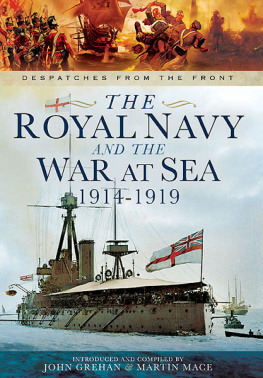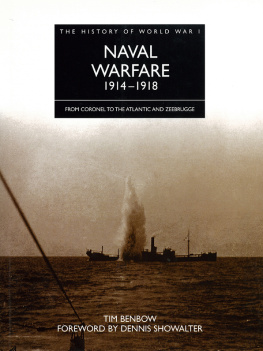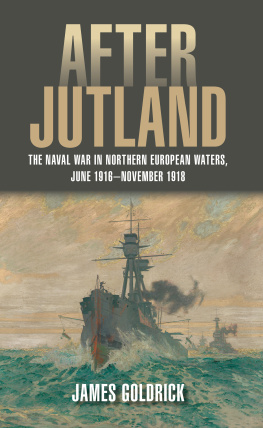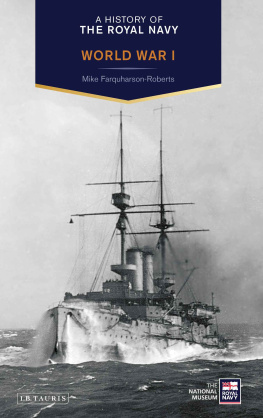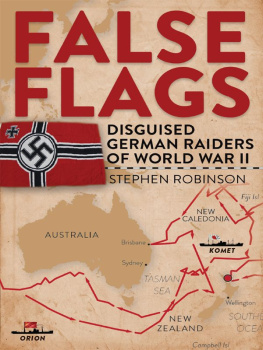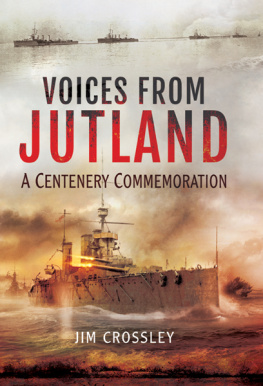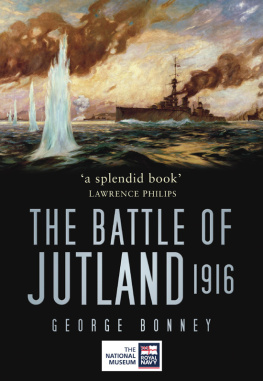
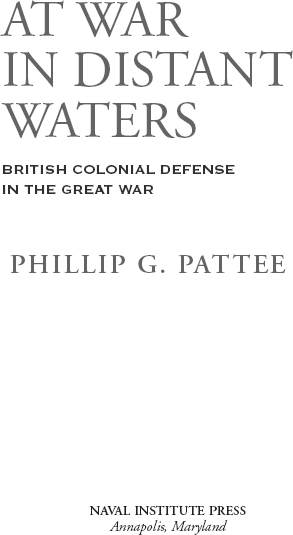
Naval Institute Press
291 Wood Road
Annapolis, MD 21402
2013 by Phillip G. Pattee
All rights reserved. No part of this book may be reproduced or utilized in any form or by any means, electronic or mechanical, including photocopying and recording, or by any information storage and retrieval system, without permission in writing from the publisher.
Library of Congress Cataloging-in-Publication Data
Pattee, Phillip G.
At war in distant waters : British colonial defense in the Great War / Phillip G. Pattee.
1 online resource.
Includes bibliographical references and index.
Summary: At War in Distant Waters investigates the reasons behind Great Britains combined military and naval offensive expeditions outside of Europe during the Great War. Often regarded as unnecessary sideshows to the conflict waged on the European continent, Pattee argues that the various campaigns were necessary adjuncts to the war in Europe, and fulfilled an important strategic purpose by protecting British trade where it was most vulnerable. Since international trade was essential for the island nations way of life, Great Britain required freedom of the seas to maintain its global trade. While the German High Seas Fleet was a serious threat to the British coast, forcing the Royal Navy to concentrate in home waters, the importance of the island empires global trade made it a valuable target to Germanys various commerce raiders, just as Admiral Tirpitzs risk theory had anticipated. Provided by publisher.
Description based on print version record and CIP data provided by publisher; resource not viewed.
ISBN 978-1-61251-195-5 (eBooks) 1. World War, 19141918Naval operations, British. 2. World War, 19141918Economic aspectsGreat Britain. 3. World War, 19141918Campaigns. 4. World War, 19141918Commonwealth countries. 5. Great BritainColoniesHistory, Military20th century. I. Title.
D581
940.45941dc23
2013022259
Maps created by Christopher Robinson.

 Print editions meet the requirements of ANSI/NISO z39.48-1992 (Permanence of Paper).
Print editions meet the requirements of ANSI/NISO z39.48-1992 (Permanence of Paper).
21 20 19 18 17 16 15 14 13 9 8 7 6 5 4 3 2 1
First printing
To
my wife, Sally, who endured this project for far too long
and
my mother, Dolores, who inspired me to love learning
CONTENTS
I would like to acknowledge the archivists and clerks at the Western Manuscripts Reading Room, Bodleian Library, Oxford; the British Library, London; the Churchill Archives Centre, Cambridge; the Parliamentary Archives; and the National Archives, Kew Gardens. I truly appreciate their courteous and efficient service, without which this book would not have been possible.
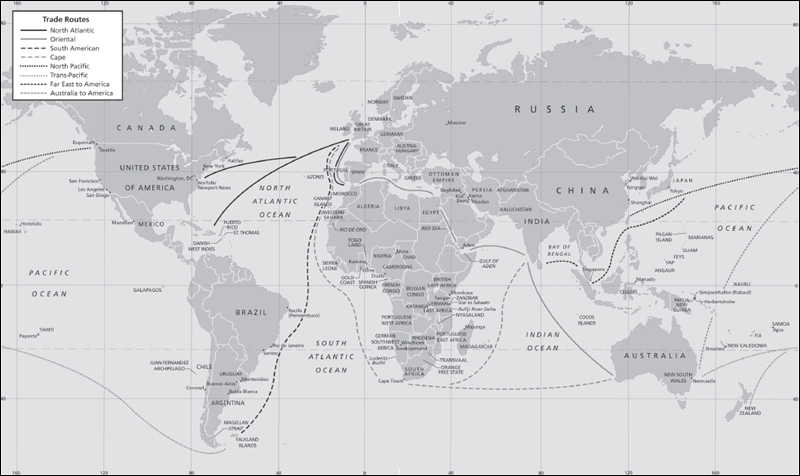

O n August 3, 1914, the eve of Great Britains entry into the First World War, Foreign Minister Edward Grey delivered a memorable speech to the House of Commons. With heartfelt eloquence, Grey captured the threat that the looming conflict posed to the island empire:
For us, with a powerful fleet, which we believe able to protect our commerce, to protect our shores, and to protect our interests, if we are engaged in war, we shall suffer but little more than we shall suffer even if we stand aside.
We are going to suffer, I am afraid, terribly in this war, whether we are in or whether we stand aside. Foreign trade is going to stop, not because the trade routes are closed, but because there is no trade at the other end.
With these words, Grey conveyed that his countrys interest in the war sprang from more than loyalty to France or a treaty obligation to preserve Belgiums neutrality. Rather, it concerned Great Britains way of life. Protecting the United Kingdoms political and economic independence would require British intervention in the war, not merely as a naval powerwhich Grey believed would suffice to prevent invasion and keep trade routes openbut also as a land power to preserve the vitality and economies of Great Britains trading partners on the European continent.
The authors of the vast body of literature on the Great War have been mesmerized by the colossal human sacrifices on the western and eastern fronts of continental Europe. They depict the huge losses sustained by the opposing forces as the inevitable result of a war directed by incompetent generals and politicians, but the Great War was in fact a world war, with fighting in Africa, the Levant, Mesopotamia, China, and far-flung islands across the Pacific. The immensity of the military effort in Europe dwarfed operations conducted in the wars other theaters. This fact has led many historians to conclude that these distant campaigns were superfluous sideshows or opportunistic attempts at imperial expansion.
At War in Distant Waters: British Colonial Defense in the Great War investigates the reasons behind the combined military and naval offensives conducted outside Europe during the war. It finds that they fulfilled an important strategic purpose by protecting British trade where it was most vulnerable. Trade was not a luxury for the British; it was essential for maintaining their way of life and a matter of national survival. The United Kingdom required freedom of the seas in order to maintain its global trade. A general war in Europe threatened Great Britains economic independence through the potential loss of its continental trading partners. The specific nature of the German threat also placed the British coast at grave risk. Military operations against German colonies were necessary to gain and maintain command of the seas while simultaneously protecting the British home islands. In Mesopotamia, overseas expeditions directed against the Ottoman Empire protected communications with India and British oil concessions in Persia. The various overseas campaigns that the British executed or encouraged constituted far more than frivolous adventurism. They formed part of a shrewdly conceived and frugally conducted grand strategy essential for British victory.
Great Britains economic and physical survival rested upon trade with its colonies, its dominions, the European continent, and the United States. Raw materials, finished goods, and capital all traversed the oceans either by ship or by telegraph. The system that enabled the British way of life was an elaborate combination of private and governmental enterprises. Naval squadrons, private merchant lines, insurance companies, telegraph cables and wireless stations, diplomats and generals, as well as treaties and international law worked together to maintain the free flow of capital and goods.
In the First World War, Germany posed the only credible threat to British security. If the German High Seas Fleet defeated the British Home Fleet, it could then bombard British cities and land raiding forces on British territory. First Lord of the Admiralty Winston S. Churchill later admitted that if the British Home Fleet had been decisively defeated by the Germans, Great Britain could [have lost] the war in an afternoon. Guarding against this possibility became Great Britains most immediate concern.
Next page



